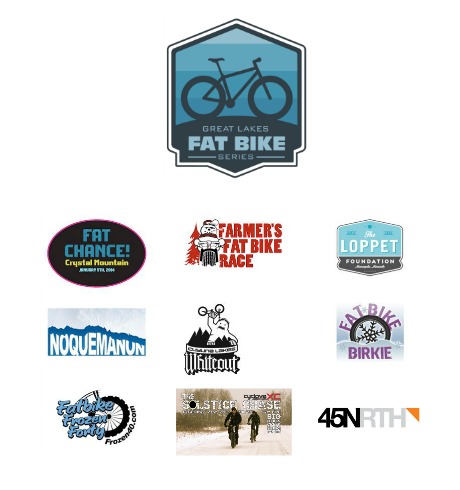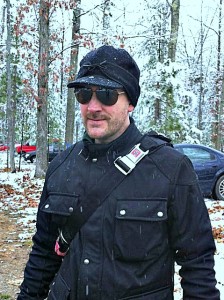Last week, I shot some questions to Scott Chambers, who is the owner of the Great Lakes Fat Bike Series (GLFBS). The GLFBS is getting ready to kick off it’s second season of fiercely competitive fat-bike races from Minnesota to Michigan. New for the 2014 season – the Great Lakes Fat Bike Series will award equal payouts, from a $2500 cash purse, to the top 5 men and women for the series points championship! 
Gomez ~ How long have you been running the Great Lakes Fat Bike Series (GLFBS)?
Scott – I started the Great Lakes Fat Bike Series last year. I had been involved with grassroots winter racing here in lower michigan for years. By 2012 it seemed like the tide had turned and a lot of people in the area were riding fatbikes instead of winterized mtbs or cross bikes. I was also starting to see races pop up all over the upper midwest. In conjunction with the race that I organize, Farmer’s Fat Bike Race, I decided that the scene needed something to tie together the biggest and best events. That led to The Great Lakes Fat Bike Series, which kicked off last January with 6 events.
Gomez ~ How many races are in this year’s series and how can people find out more information?
Scott – This year the series expands to 8 events in 3 States. There are three races that are new to the series, including The Solstice Chase, Penn Cycle Fat Tire Loppet and the Fat Chance Fatbike Race. Five events return from last year’s series: Farmer’s Fat Bike Race, The Noquemanon World Championship, The Fatbike Frozen Forty, Cuyuna Lakes Whiteout and the Fatbike Birkie. The Series website has links to all the events, as well as series info, rules, etc. www.greatlakesfatbikeseries.com
Gomez ~ What do you feel are the keys to the success of the GLFBS?
Scott – A couple of things are driving the success of the Series. Initially it’s the rapid development of fatbikes by manufacturers like Salsa, Surly, etc, and the corresponding development of winter gear by companies like 45NRTH. That has made cycling a four season activity. It got people outside! And that helped bring in sponsors like 45NRTH, Twin Six and 1Up USA. The most important factor in the success of the GLFBS, though, is that each of the events is professionally run, and the race venues and formats offer riders a unique experience. Whether it’s the chance to ride trail that’s closed all winter to bikes, like at the Noquemanon, or the opportunity to ride a fatbike specific course, like at the Frozen Forty, Cuyuna Lakes or Farmers Fat Bike Race, all of the events have something going for them beyond what riders will find at their local ride or winter fun event. There’s also something amazing about a mass start of hundreds of fatbikes that you just have to experience!
Gomez ~ Are you involved with designing each of the race courses featured in the series?
Scott – I’m only involved in the design of Farmer’s Fat Bike Race. That’s my baby. Together with my team members we created that one from scratch and we design our course specifically for fat bikes. In the case of most of the other events in the series, promoters are using groomed ski or fatbike specific trails and creating point to point or loop courses that highlight the best terrain in their area.
Gomez ~ Do you think there will ever be a sanctioning body for Fat-Bike Racing?
Scott – I hope not. If there is my event won’t be part of it. I can’t speak for the other promoters in the series. But I have taken a lot of ques from the massive growth of endurance racing over the past two decades. The biggest ultra mtb series in North America isn’t the one sanctioned by a licensing business. It’s the one that was created and supported by ultra promoters and racers. I see winter fatbike racing following a similar trajectory. The last thing winter racing needs is somebody to stand between riders and their sport. I do think, though, that the sport should give back. But I think that should be through advocacy and not heirarchical licensing nonsense.
Gomez ~ Do you see Fat-Bike Racing adopting Race Categories like other disciplines of bicycle racing?
Scott – Possibly. I looked at adding a Masters class to this year’s series, but not all the promoters were ready for that and seperating the results after the events was problematic. I think that if the sport continues to grow we’ll see some additional divisions.
Gomez ~ Who are the top 3 male and female racers in your series?
Scott – If we look at people who raced last year and will almost certainly be back, I ‘d have to say the man and woman to beat will be Jorden Wakeley and Danielle Musto. Jorden is one of the most powerful pro mtb riders in the great lakes region and Danielle has a crazy resume that includes winning Single Speed USA, a national championship and countless ultra wins. Both of them are hard core winter bike riders, and I know that they’re both planning to defend their 2013 series titles. I would also pay close attention this winter to Evan Simula, Dave Hoglund and Jesse LaLonde. Jesse has the chops to contest for the series overall and Evan and Dave took 2nd and 3rd last year. On the women’s side April Morgan is a serious threat to win every race she enters on snow. Martha Flynn-Kauth, who took third in the series last year was only beaten by two people last winter (Danielle Musto and April Morgan.) Beyond that it sounds like we’ll see some surprises too. Many of the races are garnering strong early registration. I expect to see a few more strong summer mountain bike racers making the transition this year.
Gomez ~ What can racers, their families and fans expect when they attend a GLFBS event?
Scott – A quality event! All the races in the Great Lakes Fat Bike Series are run by people who have experience in event promotion AND winter cycling. In choosing the events for the series my first concern was whether I myself would pay the fee and travel to each of the events. And I’m happy to say that I would and I will. Expect a quality winter cross country course, beautiful scenery and trail, and hundreds of other fatbike riders rolling around with great big smiles on their faces. These races are big, but they’re also a ton of fun. Many of them, like the Penn Cycles Loppet are also run in conjunction with bigger winter festivals, or like the Fat Chance race they’re held at Ski lodges that have other activities for the kids and family to enjoy.
Gomez ~ What advise would you pass along to a new racer entering their first fat bike race?
Scott – Have fun! It’s winter up North and you get to ride outside on beautiful trail while the rest of the summer season cyclists sit in their basements on their trainers staring at their wattage! Welcome the snow and don’t worry. Winter was made for fatbikes.
The winter racing season is coming up fast. Many of the best races fill up fast, so register early and let us know which races you think are the cream of the crop!


No comments yet.